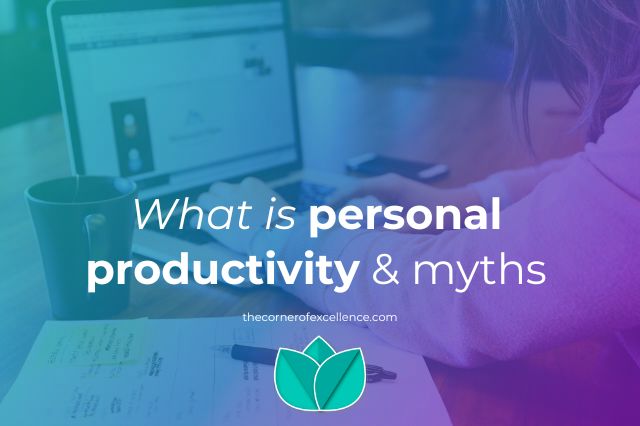There is a lot of talk about productivity and personal productivity. But what does it really mean? Let us briefly review history and significance. Then we will go through what hurts our personal productivity and some myths.
History of productivity
During the early days of the industrial revolution, in the 18th century, the economist Adam Smith spoke of specialisation being necessary to increase productivity. From the end of the 19th century the study of productivity and how to increase it in factories gained momentum. One seeks to reduce idle time for workers and improve workflows.
From team productivity to personal productivity
In the continuous search to improve productivity, philosophies and methods such as kaizen, lean manufacturing, Kanban, Six Sigma, Scrum and more arise. Most focus on improving the production process and teamwork.
It is with Peter Drucker, in the second half of the 20th century, when the concept of personal or individual productivity begins to emerge. From there, proposals such as those of Steven Covey and David Allen arise.

What is productivity
We can define productivity as how many products or services are obtained from the factors used. These factors are raw materials, workers, capital, time and other resources used. Therefore, achieving maximum productivity means obtaining the best performance from the available resources.
What is personal productivity
Given the definition of productivity, it is clear that we can apply it on a personal level. Being productive, then, means getting the best performance with the resources that we have at our disposal. These resources are the time available, our knowledge and skills as well as the work tools at our disposal.
However, to use our resources properly we must add another important factor. Being productive does not simply mean doing any task to the best of your ability or carrying out the maximum number of tasks. It means choosing the right tasks. For this, it is essential to have clarity about our mission, priorities and objectives.
What harms our personal productivity
When producing goods and services, contingencies may arise. In the same way, as individuals we also face factors that can harm our productivity.
Inadequate work tools
The lack of necessary and adequate tools for our work slows us down or prevents us from performing at our best. Thinking of office work, we need adequate furniture, a well-performing computer, all the necessary applications and a good internet connection.
We can also include in this section the proper use of tools for tracking objectives, managing projects and task lists.

Lack of knowledge
Another factor that can slow us down at work is a lack of knowledge. Whether it is the knowledge to use certain tools or to carry out certain tasks, it is essential to train and keep up to date if we want to be productive.
Tiredness or malaise
Furthermore, tiredness can wreak havoc on our productivity. If we do not get a good night’s rest or take breaks during the day, we will notice it in our ability to concentrate and solve problems.
The same goes for our well-being. If we are sick or do not feel well, it is natural to have a hard time performing well.
Time thieves
Lastly, there are various time thieves that harm our personal productivity. Distractions and interruptions reduce our concentration.
The lack of foresight and planning lead us to a reactive way of working. Then we tend to pay more attention to what arises than to the important tasks that allow us to be truly productive.
In relation to the previous point, not being clear about our priorities and objectives also hurts our productivity. If we do not know what is most important and what we want to achieve, it will be difficult for us to focus our effort properly.

Myths of personal productivity
Once we have reviewed the aspects that harm our productivity, let us talk about myths. The next three myths also have an adverse effect on personal productivity; either because of a poor understanding of what productivity is, or because of not managing our time properly due to the belief.
Time is money
It seems that the ancient Greeks already used this phrase. However, Benjamin Franklin is credited with the exact phrase: “Remember that time is money” as advice on time management and frugality.
Although the phrase is deeply ingrained in popular vocabulary, we should remember that time is actually more valuable than money. Money can accumulate, but time cannot. That is why taking advantage of our time in the best way on a personal and professional level is key.
Being productive means getting the maximum work done
Yes and no. For this, we ought to review the concept of “maximum work”. This way of thinking leads us to productivity in a chain-production sense. In other words, producing the maximum number of units.
But when we speak of personal productivity of knowledge workers, other factors and objectives come into play. In reality, the one who works the most need not be the most productive. It is the one who performs tasks that create more value who is more productive.
For this, it is essential to know our mission well. Whether we work for someone else or for ourselves, with which tasks do we create more value? Thinking about our personal life, which activities bring us more well-being and strengthen our personal relationships?
Rest is for the weak
Do you think you have too much work to take the occasional break? Do you think you are a super worker who does not need to rest? Well, I am sorry to disappoint you because taking breaks really makes us more productive. Our body and mind need to recover from the efforts.
Have you ever got stuck with solving a task or problem? You have put it aside for a while to dedicate yourself to something else. And then when you got back to it, you suddenly saw it clearer and solved it? When we rest we allow our subconscious to work. We help our brain to form neural connections and let knowledge take root.
How about your personal productivity?
From what we have seen, improving our personal productivity means using knowledge, skills, techniques and tools to carry out the correct tasks in the most effective way.
Did you know the definition of productivity and personal productivity? Which of the factors that damage productivity usually affect you? Have you fallen for any of the myths?

Sharing is caring!




